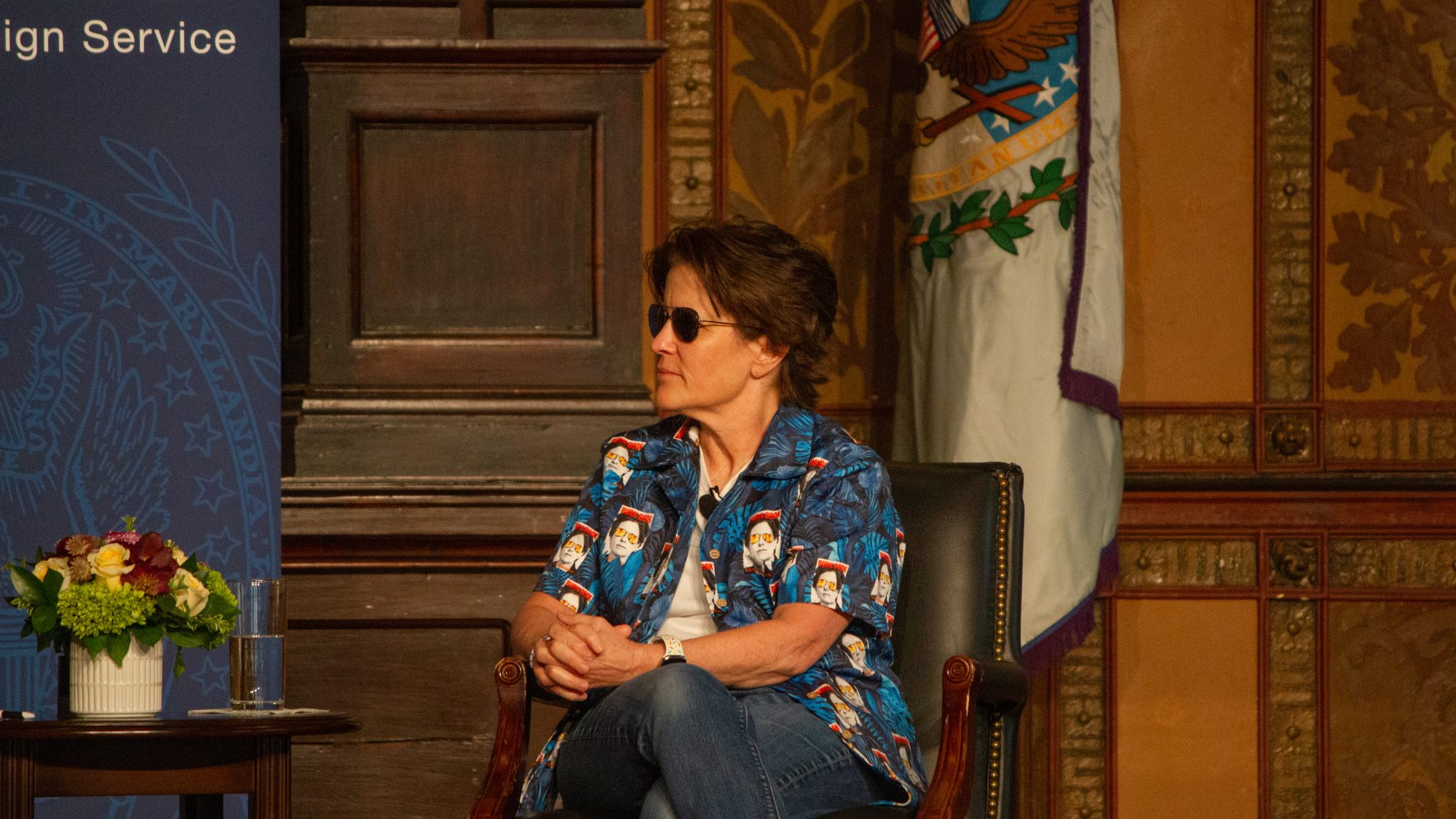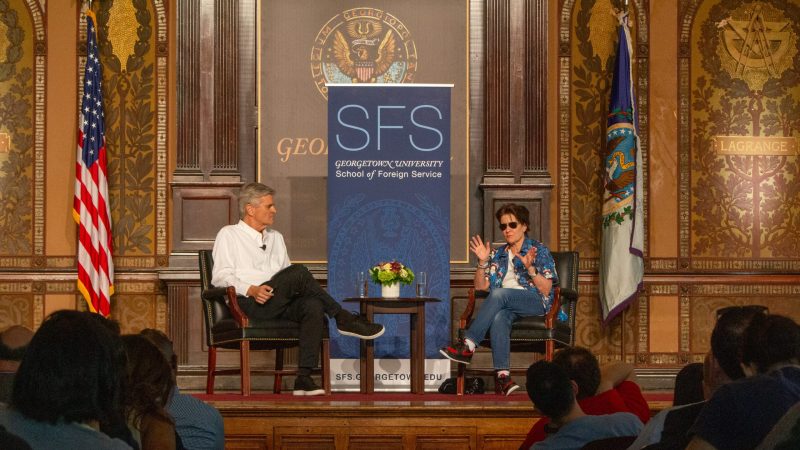On March 14, longtime tech journalist and alumna Kara Swisher (SFS’84) returned to Georgetown for a conversation with AOL co-founder Steve Case about her new memoir, “Burn Book: A Tech Love Story.”

The book traces the three decades she spent covering technology for The Washington Post, The Wall Street Journal, The New York Times, New York magazine and the tech news site she founded with Walt Mossberg, Recode. She currently hosts the podcast “On with Kara Swisher” and co-hosts the “Pivot” podcast with NYU professor Scott Galloway, both for New York magazine.
Throughout her career, Swisher has interviewed major power players in the tech industry, including Steve Jobs, Elon Musk and Mark Zuckerberg. During the talk, she shared anecdotes about her time working with these figures and argued that the massive power of technology should not be held by the very few.
“I think that’s what I worry about: the data is ours, we paid for the internet, they benefited from it, and then they get to do anything they want? And let me tell you, since I know all these people, you don’t want them making decisions for you,” Swisher said. “We have to, sort of, take control of it back from them, and I fear we will not.”
Getting Online

Swisher began her time as a journalist as an undergraduate at Georgetown, where she was a features writer for The Hoya and a contributor to The Washington Post. While working at the Post, Swisher was assigned to cover AOL and met Case, introducing her to the tech world that would become her specialty. Swisher’s first two books, “AOL.com” and “There Must Be a Pony in Here Somewhere,” chronicle AOL’s rise and fall. During the conversation, Swisher highlighted the importance of AOL’s ascendence.
“You could see the media companies really struggling to know what to do [with digital]. I always felt you [AOL] were a media company, you offered up those kinds of things, but you glommed on community to it, and constant accessibility,” Swisher said. “Nobody was doing that.”
Hope and Heartbreak
In the early days of the tech world’s explosion, Swisher describes a kind of optimism that quickly gave way to despondency as it became clear that tech power players were going to act without consequences and profit wildly. This shift provided the inspiration for Swisher’s book, which begins as a “love story” and ends somewhere decidedly more pessimistic.

“When you saw the possibilities of commonality, of bringing people together, of finding talent everywhere, and then they [tech company leaders] just wanted to sell advertising and take all your data, or they didn’t care for the implications of what they were doing, it irritated me,” Swisher said. “And then when you realize they were the richest people in the world with unaccountable power, that’s a prescription for disaster, as you’re seeing now.”
Even if private tech companies aren’t run by bad actors, Swisher sees their unchecked power over their users as a major cause for concern. She shared stories about butting heads with tech figures over her outspoken approach to advocating for regulation. She recalled receiving calls from executives at Google after criticizing the company’s move to buy Yahoo’s search engine. She held her ground and warned that technology controlled by a single actor, regardless of their intentions, could have disastrous consequences. It’s a lesson that has stuck with her today.
Tech Today and Tomorrow
Assessing the state of the tech world today, Swisher stressed both the negative domestic and foreign policy implications of failing to regulate technology. In the U.S., misinformation and conspiracy theories run rampant on social media sites like Facebook and X, she said, while hostile foreign powers have exploited the lack of controls on these platforms to influence American politics. Reflecting on the recent bill restricting TikTok that passed the House, Swisher encouraged lawmakers to continue considering the national security implications of leaving technology unregulated.
“I feel like this is the opportunity to finally regulate the internet and not think it’s a dirty word,” she said.

Swisher also responded to student questions, including on the shifting landscape of journalism in the age of technology and the potential benefits of policies like the European Union’s artificial intelligence regulations to create a healthier digital space.
Ultimately, Swisher is cautiously optimistic about the burgeoning interest in regulating tech, especially after traveling the country for her book tour.
“I think there’s a real movement in this country of worry about the power of tech over people’s lives and the desire to take it back from people. That I’m feeling really strongly, and I hadn’t felt it until I got out there,” she said. “I think parents are concerned, I think people that believe in civics are concerned, and they know what’s happening, and yet they know they need to be online and how important these technologies are. And so that’s been heartening, I have to say, that’s been super heartening.”

